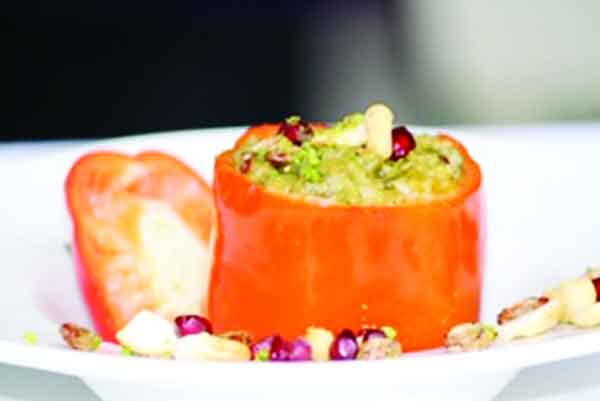Blooms at Eros Hotel celebrates the city’s regional cuisine and Dhruvika Bhanot finds that its dishes are not only eclectic but on the same wavelength of authenticity
By the time we clocked the end of our dinner, Jonathon Gold’s remark, “You can’t fake hummus. It is either on point or your grandmother goes home,” was incessantly resonating in my mind. Only instead of the Middle East, I was in the lap of Rampur cuisine, and in place of the hummus, I was fussing over Baigan achari, which seemed to be a proud favourite of masterchef Suroor Khan. Among our conversations about the place, nawabs, creating jobs for cooks from Rampur, he mentioned that their Baigan achari is somewhat of an indisputable force against all other brinjal oriented dishes. It has small pieces of brinjal marinated and cooked in tangy gravy. I had never been more excited to try a vegetarian dish.
The menu is curated following an extensive hands-on research to create dishes that are not only eclectic but are on the same wavelength of authenticity that one would find in Rampur. Rampuri cuisine is essentially a ‘courtly cuisine’ that evolved along with its sultans and their taste buds. It is a blending clout of Mughlai, Awadhi, Afghani, Rajput and other cultures. Sadly, these recipes have not been chronicled and are thus lost over the years. It is a few chefs and hotels who are doing their best to revive Rampuri cuisine.
If you find yourself at Blooms restaurant, Eros Hotel, Nehru Place, with a plate of Tar Korma, one of the signature dishes and Mirch ka saalon which is lightly spiced and slightly tangy curry cooked in green chilli, just know that this is as authentic as it can get. Quite literally though since chef Suroor belongs to the lineage of royal cooks or khanasas of nawabs of Rampur. Taste is sacred in the city and uncompromised, believes chef Sudarshan. He said that the cuisine is a nice combination in terms of taste, texture and presentation.
Mewa mave ka shaami became another of my favourites, it is kebab made with condensed milk and filled with dry fruits. It is slightly sweet, courtesy of the mewa and melts on the tongue. Another hit on her tale were Dahi ke kebab which are crumbed fried yogurt balls seasoned with Rampuri spices, a mixture of 35 to 40 spices. The food is flavourful for one, no surprise there but it is also neutral and balanced in taste, so fortunately there won’t be the risk of hot flashes or hike in diabetes.
One of my personal favourites till the next day remains Kacche gosht ki tikki, a traditional lamb patty seasoned with homemade spices. Chef Suroor shared an interesting anecdote behind this dish. In earlier days, while on hunt, the nawabs would cook meat by themselves with whatever spices they could get hold of. The dish on the menu is reflective of that time, the meat is lightly marinated and slightly raw.
Chef Suroor’s Saans-e-dum pulao is magnificent, a traditional preparation of Rampur, basmati rice, lamb and chicken prepared as a Yakhni pulao. And as you scrape through the spoonfuls, the dish becomes a sonnet of flavour, texture and aroma. As both the chefs mentioned, half the taste of the cuisine is in its smell. The people who used to find refuge in Rampur brought their own flavour to the kitchens and it still remains diverse in taste.
One of the desserts, with the most interesting name, Mirchi ka halwa, needs an honorary mention. The spice quotient of the green chillies and capsicum is eclipsed by sweetening them and this might seem the most uniquely created desserts to someone who’s been living under the rock when it comes to Rampuri food but you might also want to try Gulatthi. It is their signature dessert, sweetened and reduced milk, thickened with rice and garnished with kernels and silver leaf. True to the chef’s words, it is definitely not the sweetest. However, what it is not is something to be missed on.
But why Rampur? Because Rampuri cuisine has a taste but no name, is what chef Suroor shared. And even though Delhi is a hub of cultures, this cuisine has found itself aloof and hidden in kitchens at home. The chefs want it to reach to as many people. Not only this, jobs are being created. Chefs from Rampur are here, so there is exposure and experience on both sides of the spectrum, the chefs and the diners.
This experience of dining would remain unparalleled, from the food to the service to the bits of history of Rampur that was shared in conversations, a few phrases would certainly lack justice to an evening of amiability and warmth.


























